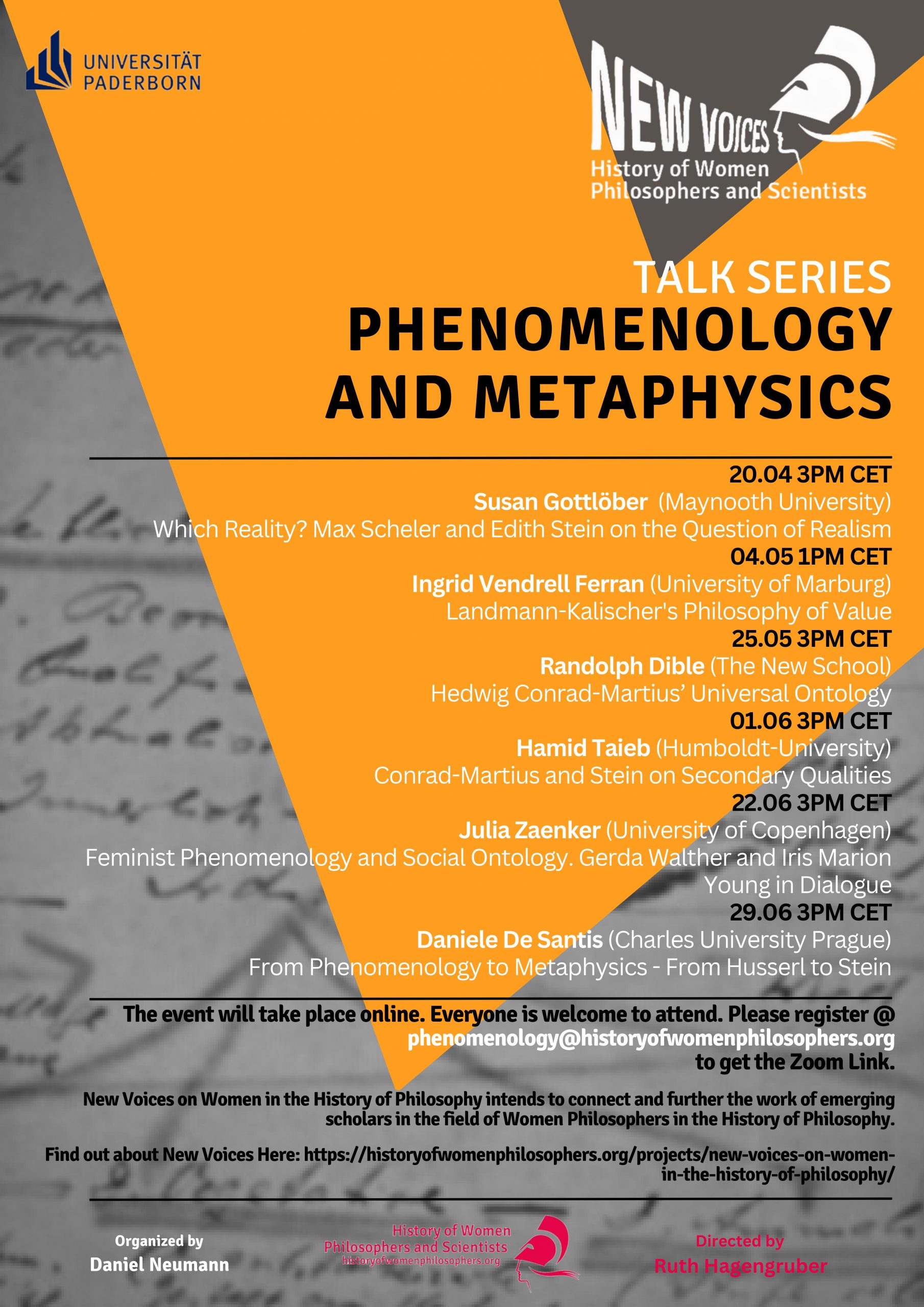 The Summer Term Talk Series, organised by Daniel Neumann, Research Fellow at Paderborn University, is dedicated to Phenomenology and Metaphysics. The first talk will take place on Thursday, 20th of April, at 3 pm (CET).
The Summer Term Talk Series, organised by Daniel Neumann, Research Fellow at Paderborn University, is dedicated to Phenomenology and Metaphysics. The first talk will take place on Thursday, 20th of April, at 3 pm (CET).
Everyone is welcome to attend. To register and to receive the zoom invitation, please send an email to phenomenology@historyofwomenphilosophers.org
The program:
20th of April (3PM to 5PM): Susan Gottlöber: “Which Reality? Max Scheler and Edith Stein on the Question of Realism”
Abstract: Although Max Scheler and Edith Stein did not specifically engage in the topic of realism during their lifetimes, they can both be considered representatives of realism. This paper aims to investigate and compare Scheler’s and Stein’s positions in the re-emerging realism debate of the early 20th century. In line with Sepp’s observation that the individual’s position on the realism-idealism controversy reflects their philosophical stance (Sepp 2003), I will examine their positions in the context of their respective Weltanschauungen, influences, and responses to contemporary questions. Ultimately, I argue that while their positions share superficial similarities, they remain incompatible on key issues due to their opposing developments in their philosophical and ideological worldviews.
4th of May (1PM to 3PM): Íngrid Vendrell Ferran: “Landmann-Kalischer’s Philosophy of Value”
Abstract: This talk aims at exploring Landmann-Kalischer’s analogy between the sensing of secondary qualities and the feeling of values in her work “Philosophie der Werte” (Philosophy of Values) (1910). Attention is paid to the epistemic motivation of the analogy, the distinction between pure feelings and affects, and the relation of pure feelings to value judgments. As I shall argue, for Landmann-Kalischer, feelings can be both intentional and cognitive.
25th of May (3PM to 5PM): Randolph Dible: “Hedwig Conrad-Martius’ Universal Ontology”
Abstract: Hedwig Conrad-Martius (1888-1966) is gaining recognition as an important representative of early phenomenological realism, but her philosophy transcends that designation. Conrad-Martius’ realism is housed in a reformed classical philosophical universalism, and this becomes especially evident in her late project of universal ontology. Universal ontology is an ontological account of everything—“absolutely everything”—that there is: “[Not only] material, formal and categorical objects, not only real and ideal… not only purely fictitious objects, but… also purely conceptual objects, that is, objects to which nothing actually objective corresponds” (Das Sein, 40). To better appreciate her contribution, I will describe this late project, and contextualize it in terms of her spirituality, her cosmology, and her influences and resonances.
1st of June (3PM to 5PM): Hamid Taieb: “Conrad-Martius and Stein on Secondary Qualities”
Abstract: In this paper, I will discuss the views of Conrad-Martius and Stein on secondary qualities. More precisely, I will address the question of the non-reducibility of these qualities. Both Conrad-Martius and Stein reject the thesis that sensory qualities such as colours, sounds, odors, and similar properties, are identical to physical entities studied by the natural sciences, such as light waves or other imperceptible entities. Their respective arguments are based on a similar strategy: they both argue that there are specific qualitative differences in every class of sensory qualities, whereas the attempts to describe these qualities in terms of imperceptible physical entities erase these qualitative differences in favour of mere quantitative differences. I will go through their arguments, which, in the case of Conrad-Martius, interestingly rely on views from Goethe. I will then ask what exactly Conrad-Martius and Stein defend, that is, whether their claims are merely about the unreducible nature of colours and others sensory qualities to imperceptible physical entities or whether they also defend realism, that is, that these qualities do exist in the world around us.
22nd of June (3PM to 5PM): Julia Zaenker: “Feminist Phenomenology and Social Ontology. Gerda Walther and Iris Marion Young in Dialogue”
Abstract: Gerda Walther’s work in phenomenology is often presented in light of the metaphysical struggles of its founding fathers, namely Pfänder’s realistic phenomenology, Husserl’s transcendental turn and Heideggerian ontology. Instead, I want to revisit Walther’s phenomenological approach to social ontology by reflecting on the relation between metaphysics and feminist phenomenology. To do this, I bring her into dialogue with Iris Marion Young’s careful perspective on the contemporary reality of political activism. My analysis juxtaposes Walther’s description of the reflective, self-referential nature of communities with Young’s suggestion to think about gender as a serial collective. I argue that this points towards a possible meaning of Walther’s “realist” commitments that invites us to read and apply her work beyond the standard interpretative paradigms.
29th of June (3PM to 5PM): Daniele De Santis “From Phenomenology to Metaphysics – From Husserl to Stein”
[Lecture has been cancelled]
Download Talk Series Poster.
You cannot copy content of this page








